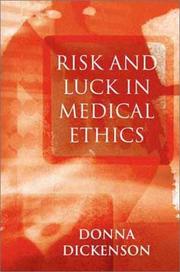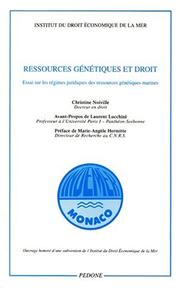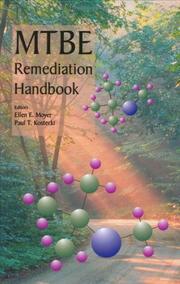| Listing 1 - 6 of 6 |
Sort by
|
Book
ISBN: 9282742814 Year: 1996 Publisher: Luxembourg EUR-OP
Abstract | Keywords | Export | Availability | Bookmark
 Loading...
Loading...Choose an application
- Reference Manager
- EndNote
- RefWorks (Direct export to RefWorks)
Hygiene. Public health. Protection --- Sociology of work --- Social law. Labour law --- Consignes de sécurité --- Prescriptions de sécurité --- Règles de sécurité --- Safety regulations --- Sécurité [règles ] --- Veiligheidsbeleid --- Veiligheidsvoorschriften --- 301.188.0 --- 351.83 --- 613 --- 332.821 --- 658.332 --- EEC / European Union - EU -Europese Unie - Union Européenne - UE --- 615.3 --- Gezondheid --- Risicobeoordeling --- Veiligheid --- risico-evaluatie --- arbeidsveiligheid --- gezondheid --- Werkomgeving --- Sociologie van de arbeid --- Sociaal recht. Arbeidsrecht --- Hygiëne. Gezondheidszorg. Bescherming --- Arbeidsveiligheid.Arbeidsongevallen. --- Hygiëne. Arbeidsveiligheid. Comfort. --- Lichaamsverzorging --- Arbeidsveiligheid.Arbeidsongevallen --- Hygiëne. Arbeidsveiligheid. Comfort --- Medical policy --- European Union countries

ISBN: 213052995X 9782130529958 Year: 2003 Publisher: Paris : Presses Universitaires de France,
Abstract | Keywords | Export | Availability | Bookmark
 Loading...
Loading...Choose an application
- Reference Manager
- EndNote
- RefWorks (Direct export to RefWorks)
La cause est entendue. Nos sociétés modernes créent des risques nouveaux : amiante, sang contaminé, vache folle… Dans ce livre d'une remarquable clarté, la juriste Christine Noiville nous rappelle que ces risques " manufacturés " sont le plus souvent " soustraits au champ de la décision individuelle ". Se pose alors à notre démocratie et à l'action publique la question de leur acceptabilité. Jusqu'à une période récente, on considérait qu'un risque était acceptable dès lors qu'il était indemnisable. Cette conception est dépassée. L'auteure s'emploie à identifier ce que pourrait être un mode de " gouvernement des risques " dont le désormais fameux principe de précaution ne préfigure que l'ébauche. Dans ce domaine, la science ne peut pas occuper une situation de monopole. Le premier enjeu consiste donc à faire entrer le citoyen dans le jeu. " Un risque n'est pas en soi acceptable, il le devient par le prisme du débat, qui lui donne sa légitimité. " Mais on ne peut en rester là. " On sait bien quelles sont les vertus du débat en tant que procédure, avec sa garantie de transparence de points de vue, d'expression des conflits. Mais on sait aussi que pour qu'il soit de qualité, il faut en structurer le contenu. " D'où la nécessité, et c'est le deuxième enjeu, de fixer des critères de procédure (évaluation, information, contrôle juridictionnel des décisions…) et de fond (nature du risque, répartition de la charge du risque…). Bref, comme le dit l'auteure elle-même, une question politique.
Environmental risk assessment --- Liability for environmental damages --- Government liability --- Law and legislation --- veiligheid --- risicomanagement (risico-evaluatie, risicobeheer) --- voorzorgsbeginsel (voorzorgsprincipe) --- beleid (politieke aspecten) --- maatschappelijke evolutie (sociale verandering) --- recht (wetgeving, rechtspraak, rechtsbeginselen, juridische aspecten, aansprakelijkheid) --- sécurité (principe de sécurité) --- évaluation du risque (gestion du risque) --- précaution (principe de précaution) --- politique (aspects politiques) --- évolution sociale (changement social) --- droit (aspects juridiques, législation, jurisprudence, principes de droit, responsabilité) --- Environmental damages, Liability for --- Environmental law --- Liability (Law) --- Torts --- Risk assessment --- Precautionary principle --- Droit international. --- Principe de précaution. --- Gestion du risque. --- Environmental risk assessment - Law and legislation - France --- Liability for environmental damages - France --- Government liability - France

ISBN: 0745621465 0745621457 Year: 2003 Publisher: Cambridge Polity Press
Abstract | Keywords | Export | Availability | Bookmark
 Loading...
Loading...Choose an application
- Reference Manager
- EndNote
- RefWorks (Direct export to RefWorks)
Ethics is commonly assumed to be the one realm in which luck and risk do not intrude. It has been said that 'While one can be lucky in one's business, in one's married life, and in one's health, one cannot, so it is commonly assumed, be subject to luck as far as one's moral worth is concerned.' But although we do not normally hold people responsible for outcomes beyond their control, a serious examination of the role of luck and risk may lead us to conclude that very few outcomes are really within people's control. This is the paradox of 'moral luck'. Risk and Luck in Medical Ethics examines the 'moral luck' paradox in greater detail, relating it to Kantian, consequentialist, and virtue-based approaches to ethics. Dickenson applies the paradoxes of risk and luck to medical ethics, including timely discussion of risk and luck in the allocation of scarce health care resources, informed consent to treatment, decisions about withholding life-sustaining treatment, psychiatry, reproductive ethics, genetic testing, and medical research and evidence-based medicine. The book concludes with an examination of the relevance of risk and luck in a medical context to the study of global ethics. If risk and luck are taken seriously, it would seem to follow that we cannot develop any definite moral standards at all, that we are doomed to moral relativism. However, Dickenson offers strong counter-arguments to this view that enable us to think in terms of universal standards for judging ethical systems. This claim has direct practical relevance for practitioners as well as philosophers.
Fortune. --- Medical ethics. --- Risk. --- Uncertainty. --- moraalfilosofie --- bio-ethiek (medische, biomedische ethiek, bio-ethische aspecten) --- risicomanagement (risico-evaluatie, risicobeheer) --- veiligheid --- geluk (onzekerheid) --- aansprakelijkheid --- verantwoordelijkheid (verantwoordingsplicht, verantwoording) --- ethiek (ethische aspecten) --- philosophie morale --- bioéthique (éthique médicale, biomédicale, aspects bioéthiques) --- évaluation du risque (gestion du risque) --- sécurité (principe de sécurité) --- chance (incertitude) --- responsabilité --- responsabilité (imputabilité, obligation de rendre compte) --- ethique (aspects ethiques) --- Fortune --- Medical ethics --- Risk --- Uncertainty --- Reasoning --- Economics --- Probabilities --- Profit --- Risk-return relationships --- Biomedical ethics --- Clinical ethics --- Ethics, Medical --- Health care ethics --- Medical care --- Medicine --- Bioethics --- Professional ethics --- Nursing ethics --- Social medicine --- Luck --- Opportunity --- Moral and ethical aspects

ISBN: 2233003241 9782233003249 Year: 1997 Publisher: S.l. Pedone
Abstract | Keywords | Export | Availability | Bookmark
 Loading...
Loading...Choose an application
- Reference Manager
- EndNote
- RefWorks (Direct export to RefWorks)
Genetic engineering --- Marine resources conservation --- Génie génétique --- Conservation des ressources marines --- Law and legislation. --- Droit --- Biotechnology industries --- Biodiversity conservation --- Patents. --- genetisch gemodificeerd organisme (GGO) --- veiligheid --- risicomanagement (risico-evaluatie, risicobeheer) --- voorzorgsbeginsel (voorzorgsprincipe) --- genetisch patent --- biotechnologie --- patent (octrooi, patentrecht, octrooirecht, biopatent) --- organisme génétiquement modifié (OGM) --- sécurité (principe de sécurité) --- évaluation du risque (gestion du risque) --- précaution (principe de précaution) --- brevet génétique --- brevet (brevetabilité, brevetabilité biologique, droit de brevet, droit des brevets, brevetabilité du vivant) --- Génie génétique --- Marine resources --- Marine resources conservation (International law) --- Law of the sea --- Designed genetic change --- Engineering, Genetic --- Gene splicing --- Genetic intervention --- Genetic surgery --- Genetic recombination --- Biotechnology --- Transgenic organisms --- Medical laws and legislation --- Environmental law --- Law and legislation --- Patents --- Animaux marins --- Plantes marines --- Organismes transgéniques --- Ressources génétiques --- Droit. --- Évaluation du risque --- Brevets d'invention. --- Biotechnology industries - Law and legislation. --- Genetic engineering - Law and legislation. --- Marine resources conservation - Law and legislation. --- Genetic engineering - Patents. --- Biodiversity conservation - Law and legislation.

ISBN: 0226035182 0226035190 1282537385 9786612537387 0226035174 9780226035178 9780226035192 9780226035185 6612537388 9781282537385 Year: 2002 Publisher: Chicago University of Chicago Press
Abstract | Keywords | Export | Availability | Bookmark
 Loading...
Loading...Choose an application
- Reference Manager
- EndNote
- RefWorks (Direct export to RefWorks)
For much of the twentieth century, industrialized nations addressed social problems, such as workers' compensation benefits and social welfare programs, in terms of spreading risk. But in recent years a new approach has emerged: using risk both as a way to conceive of and address social problems and as an incentive to reduce individual claims on collective resources. Embracing Risk explores this new approach from a variety of perspectives. The first part of the book focuses on the interplay between risk and insurance in various historical and social contexts. The second part examines how risk is used to govern fields outside the realm of insurance, from extreme sports to policing, mental health institutions, and international law. Offering an original approach to risk, insurance, and responsibility, the provocative and wide-ranging essays in Embracing Risk demonstrate that risk has moved well beyond its origins in the insurance trade to become a central organizing principle of social and cultural life.
Risk --- Risk (Insurance) --- Responsibility --- Sociological aspects --- Responsibility. --- Sociological aspects. --- Risk - Sociological aspects. --- Risk -- Sociological aspects. --- Social Change --- Sociology & Social History --- Social Sciences --- risicomanagement (risico-evaluatie, risicobeheer) --- verzekering --- verantwoordelijkheid (verantwoordingsplicht, verantwoording) --- évaluation du risque (gestion du risque) --- assurance --- responsabilité (imputabilité, obligation de rendre compte) --- Risk (Insurance). --- #SBIB:316.334.3M50 --- #SBIB:316.8H40 --- 316.32 --- 316.32 Globale samenlevingsvormen --- Globale samenlevingsvormen --- Organisatie van de gezondheidszorg: algemeen, beleid --- Sociaal beleid: social policy, sociale zekerheid, verzorgingsstaat --- Accountability --- Moral responsibility --- Obligation --- Insurance --- Sociology of risk --- Sociology of uncertainty --- Uncertainty --- Sociology --- Ethics --- Supererogation --- Risk - Sociological aspects --- culture, cultural, insurance, responsibility, insurer, 20th century, industrial, industrialized, social, problems, welfare, worker, labor, laborer, workplace, workforce, risk, risky, compensation, claims, history, historical, academic, scholarly, research, economics, finance, contextual, institutional, mental health, wellness, safety, law, england, britain.

ISBN: 1884940293 1461348897 1461500214 Year: 2003 Publisher: Amherst, Mass. : Amherst Scientific Publishers,
Abstract | Keywords | Export | Availability | Bookmark
 Loading...
Loading...Choose an application
- Reference Manager
- EndNote
- RefWorks (Direct export to RefWorks)
The time has come for an MTBE Remediation Handbook. There are hundreds of thousands of spills of gasoline containing MTBE in the United States. More than a billion dollars are spent each year to clean up spills of gasoline and manage the risk from existing contamination. Staff of the appropriate regula tory authorities within each state must make decisions to manage these spills on a site-by-site basis. Do they require active cleanup? How much cleanup is necessary? What is the most appropriate technology? What performance should be expected from the available technology? If the state regulators pro vide good answers to these questions on a site-by-site basis, the money will be well spent. This handbook is concerned with remediation of MTBE in existing spills. There are a number of myths about MTBE that act as impediments to effec tive remediation and risk management for MTBE. These myths present MTBE as being qualitatively different from petroleum hydrocarbons. Many still think that benzene is biodegradable in ground water while MTBE is not, that risk management is appropriate for benzene and not appropriate for MTBE, and that drinking water can be treated to remove benzene but not to remove MTBE. These myths have made us reluctant to deal with existing MTBE contamination. As is documented in this MTBE Remediation Handbook, we have the technology to clean up MTBE in a rational and economic man ner.
Butyl methyl ether --- Gasoline --- Groundwater --- Environmental aspects. --- Additives --- Purification. --- mtbe (methyl tertiary-butyl ether) --- grondwatervervuiling --- grondwaterzuiveringsinstallatie --- oppervlaktewater --- risico-evaluatie --- bioremediatie --- in situ techniek --- bodemsanering --- fytoremediëring --- fysische waterbehandeling --- bioreactor --- (zie ook: reiniging grond) --- Civil & Environmental Engineering --- Engineering & Applied Sciences --- Environmental Engineering --- Environmental aspects --- Purification --- Gas (Gasoline) --- Petrol --- Liquid fuels --- Petroleum products --- Butane, Methoxy --- Methoxy butane --- Methyl-tert-butyl ether --- Methyl tertiary butyl ether --- MTBE (Chemical) --- MTBT (Chemical) --- Ether --- Additives&delete& --- Air pollution. --- Environmental engineering. --- Biotechnology. --- Ecotoxicology. --- Geochemistry. --- Atmospheric Protection/Air Quality Control/Air Pollution. --- Environmental Engineering/Biotechnology. --- Chemical composition of the earth --- Chemical geology --- Geological chemistry --- Geology, Chemical --- Chemistry --- Earth sciences --- Ecotoxicology --- Pollutants --- Pollution --- Environmental health --- Toxicology --- Chemical engineering --- Genetic engineering --- Environmental control --- Environmental effects --- Environmental stresses --- Engineering --- Environmental protection --- Sustainable engineering --- Air --- Air contaminants --- Air pollutants --- Air pollution --- Air pollution control --- Air toxics --- Airborne pollutants --- Atmosphere --- Contaminants, Air --- Control of air pollution --- Pollutants, Air --- Toxics, Air --- Air quality --- Atmospheric deposition --- Control
| Listing 1 - 6 of 6 |
Sort by
|

 Search
Search Feedback
Feedback About UniCat
About UniCat  Help
Help News
News